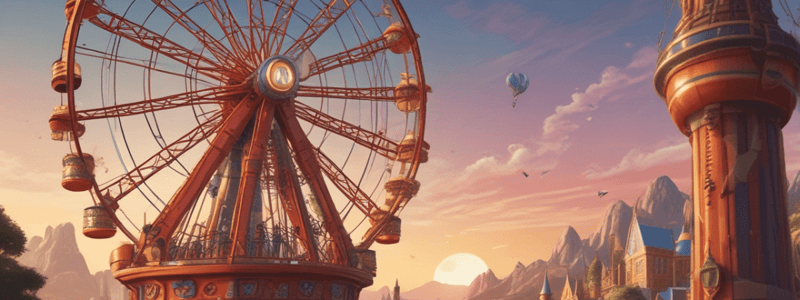Podcast
Questions and Answers
What happens to most roller coasters after the initial ascent?
What happens to most roller coasters after the initial ascent?
- They use electricity to propel the cars
- They rely on motors to maintain speed
- They use momentum to continue moving
- They do not use engines or motors (correct)
What is the maximum height of a hill or loop in a roller coaster?
What is the maximum height of a hill or loop in a roller coaster?
- It depends on the roller coaster's design
- It cannot be higher than the first one (correct)
- It can be higher than the first one
- It can be lower than the first one
What type of force accelerates you around a corner on a roller coaster?
What type of force accelerates you around a corner on a roller coaster?
- Electromagnetic force
- Centripetal force (correct)
- Centrifugal force
- Gravitational force
What would happen to your body if you were to ride a roller coaster without a seatbelt?
What would happen to your body if you were to ride a roller coaster without a seatbelt?
At what G-Force would a person most likely black out?
At what G-Force would a person most likely black out?
What do upstop wheels prevent on a roller coaster?
What do upstop wheels prevent on a roller coaster?
What was the original purpose of domesticating camels?
What was the original purpose of domesticating camels?
How do kangaroos stay buoyant while swimming?
How do kangaroos stay buoyant while swimming?
How fast can kangaroos swim?
How fast can kangaroos swim?
What is the primary reason moose swim?
What is the primary reason moose swim?
Why might kangaroos have developed their swimming ability?
Why might kangaroos have developed their swimming ability?
How do sloths swim?
How do sloths swim?
How do elephants stay afloat while swimming?
How do elephants stay afloat while swimming?
What unique adaptation do moose have to keep water out of their nostrils while swimming?
What unique adaptation do moose have to keep water out of their nostrils while swimming?
How long can sloths hold their breath?
How long can sloths hold their breath?
Why are proboscis monkeys skilled swimmers?
Why are proboscis monkeys skilled swimmers?
How do armadillos make themselves more buoyant while swimming?
How do armadillos make themselves more buoyant while swimming?
What is a unique strategy used by proboscis monkeys to scare off predators?
What is a unique strategy used by proboscis monkeys to scare off predators?
What is the name of the camel breed capable of swimming?
What is the name of the camel breed capable of swimming?
How long can proboscis monkeys swim?
How long can proboscis monkeys swim?
How far can armadillos swim?
How far can armadillos swim?
What is unique about elephants' skulls that helps with swimming?
What is unique about elephants' skulls that helps with swimming?
Why are elephants' lungs important for swimming?
Why are elephants' lungs important for swimming?
What type of plants do moose feed on while swimming?
What type of plants do moose feed on while swimming?
Flashcards are hidden until you start studying
Study Notes
Mammals' Swimming Abilities
- Moose can swim up to 20 kilometers, fully submerging themselves in the water, thanks to their unique adaptation of a long, flappy snout that acts as a valve to keep water out of their nostrils.
- Moose swim to feed on plants high in salt, essential for their growth and antler development.
Elephants' Swimming Abilities
- Elephants are good swimmers, using a lunging-style to propel themselves through the water, and their trunks as snorkels.
- Their size and body shape help them float, displacing a large amount of water, and their large lungs reduce fatigue while swimming.
- The gas in their stomachs from plant digestion inflates them, making them more buoyant, and their skull bones have holes, making them slightly lighter.
Armadillos' Swimming Abilities
- Armadillos can swim up to 50 meters, despite their appearance, using a unique technique of gulping air to inflate their stomach and small intestine, making them more buoyant.
- They can also run along the bottom of shallow water, using their powerful claws.
Camels' Swimming Abilities
- The Kharai camel breed can swim up to 3 kilometers in search of salty plants, and their name "Kharai" comes from the local word for "salty" or "saline".
- Historically, camels may have been more aquatic, but were domesticated for their milk and as draft animals, leading to a loss of their swimming abilities.
Kangaroos' Swimming Abilities
- Kangaroos are good swimmers, using their powerful legs to tread water and stay buoyant, with a unique technique of alternating their kicks, unlike their movement on land.
- They can swim at a speed of about 1 meter per second, and may have developed this ability to cross rivers or escape predators.
Sloths' Swimming Abilities
- Sloths can swim three times faster than they can walk, despite their slow movement on land, using their long arms to spread out their back legs for balance and buoyancy.
- Their slow digestion means gas builds up in their stomachs, making them more buoyant, and they can hold their breath for over 20 minutes.
- They may have inherited their swimming abilities from their semi-aquatic ancestors.
Proboscis Monkeys' Swimming Abilities
- Proboscis monkeys are excellent swimmers, and can dive into rivers from high up in trees, swimming for nearly half an hour.
- They have a unique strategy of doing cannonballs into the water to scare off predators like crocodiles.
- They have webbing at the base of their fingers and toes, which adds power to their strokes, and may have developed this ability to escape predators and find food in their mangrove habitats.
Studying That Suits You
Use AI to generate personalized quizzes and flashcards to suit your learning preferences.



